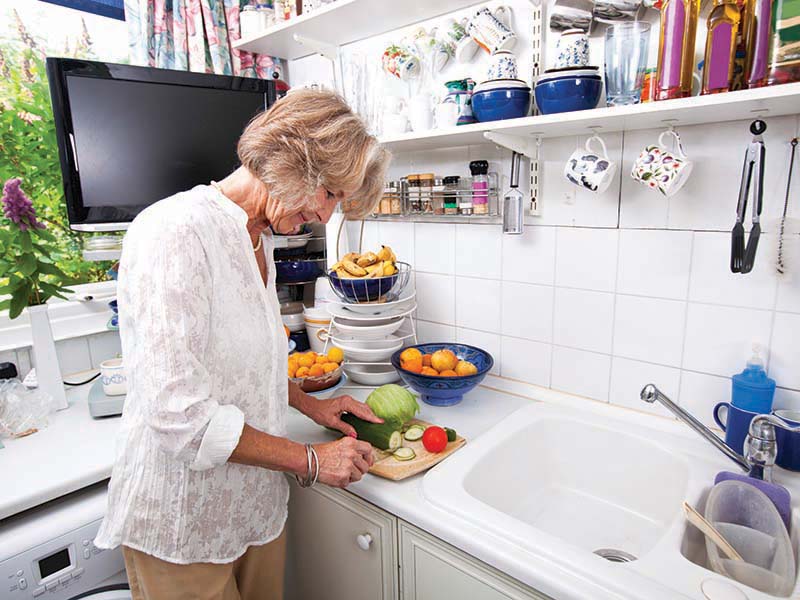Like many seniors moving into a care community, 77-year-old Helen Westfall didn’t want to leave her home. Her daughter, Ginger Thompson, did her best to make the transition easier.
When Westfall relocated last fall from West Virginia to an assisted living facility in Williamsburg, Virginia, Thompson had some of Westfall’s favorite furniture shipped in, made collages of family pictures to decorate her shelves and subscribed to all of Westfall’s hometown newspapers. She also bought a stuffed toy dog that can walk and bark and looks like Westfall’s beloved white Lhasa Apso mix, Mopsy. The real Mopsy moved in with Thompson so he could visit often.
“Familiarity and little touches of home really helped,” says Thompson, also communications director for AARP Virginia. “I told her it was a nice place with a lot to do. She was scared the first few days, and she still gets lonely and says she wants to go home, but she is happy and safe.” One mistake, Thompson adds: “I said, ‘You’ll go live there for a little while, and then we’ll see,’ even though I knew that leaving would not be possible. In retrospect, I know it’s better to be honest.”
Surveys have shown that nearly 90 percent of people ages 50 and older want to stay in their homes as they age, Thompson says. So it’s perfectly normal if the adjustment takes several weeks or months and involves significant sadness, anger, loss, guilt and embarrassment.
When Barbara Gottlieb of Richmond, Virginia, moved her mother, Delia, into Assisted Living in 2014, Delia literally screamed in the hallways that she hated her new home. Barbara made the decision after watching her mother, now nearly 97, fall victim to multiple phone and mail scams while living alone.
“It took maybe four or five months for her to adjust, which I heard from other families is not uncommon,” Gottlieb says. “Now she is completely content, which is really a remarkable thing. Everybody there knows her. The staff sees her each day and says, ‘Hi Delia, good morning!’, and just that is very comforting to her. Having familiar faces all around is so good for her.”
Gottlieb also believes the transition could have been even harder if her mother had been in more fragile health: “It’s a tricky balance to find the right time, but I am grateful that she was in good enough shape mentally that she could figure out where she was, how to get around and who people were.”
Giving seniors as much control as possible over a move also helps, says Sue Moniak, executive director of a Brookdale community in Virginia. Moniak was grateful that her own mother made the call to go into Assisted Living near her Ohio home, where she stayed happily until her passing.
Along with honest communication, multiple tours of different communities will lead to practical and gut-level matches. “Families should know and feel that team members of the community are very open to their questions, concerns and compliments,” says Jackie Macenas, executive director of Sunrise at Fountain Square outside Chicago, Illinois “Change, even for the better, is hard.”
One misconception is that a move has to be totally abrupt. “If you’re able to move and then sell your home, you can make it more gradual,” Moniak says. “You can pack your most important things first, and then see what else you have space for and want.” Specialized senior movers can help organize belongings, she adds: “In my experience, many people turn out to be relieved to shed their clutter.”
Finally, try to frame a transition as a beginning, not an ending. With good nutrition, close medication oversight, regular social engagement and fewer responsibilities, people can add quality years to their lives, Thompson notes. That’s why she has actively encouraged her mother to get out of her one-bedroom apartment, introduce herself to new people and take part in group activities.
“Isolation was one thing I really worried about with her, because that can exacerbate a lot of health problems,” Thompson says. “This was not an easy decision to make, but I feel better knowing she’s there. Maybe in some ways, she does, too.”


